【译林版】小学六年级英语毕业考试:易错知识点总结
译林版6AUnit 1 考点和易错题整理
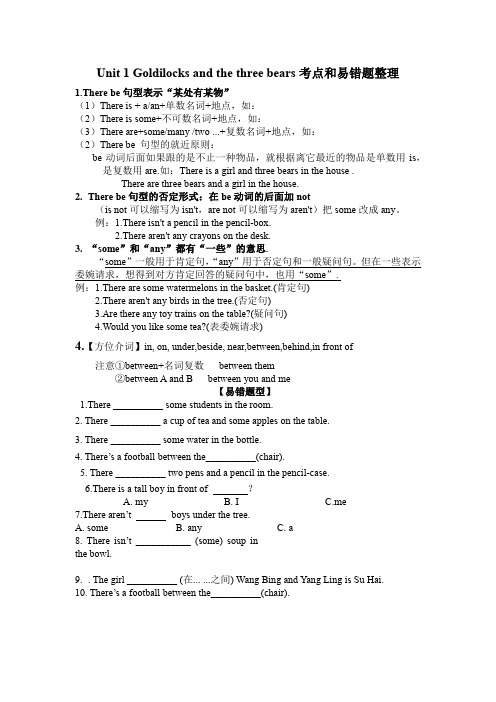
Unit 1 Goldilocks and the three bears考点和易错题整理1.There be句型表示“某处有某物”(1)There is + a/an+单数名词+地点,如:(2)There is some+不可数名词+地点,如:(3)There are+some/many /two ...+复数名词+地点,如:(2)There be 句型的就近原则:be动词后面如果跟的是不止一种物品,就根据离它最近的物品是单数用is,是复数用are.如:There is a girl and three bears in the house .There are three bears and a girl in the house.2.There be句型的否定形式:在be动词的后面加not(is not可以缩写为isn't,are not可以缩写为aren't)把some改成any。
例:1.There isn't a pencil in the pencil-box.2.There aren't any crayons on the desk.3.“some”和“any”都有“一些”的意思.“some”一般用于肯定句,“any”用于否定句和一般疑问句。
但在一些表示委婉请求,想得到对方肯定回答的疑问句中,也用“some”.例:1.There are some watermelons in the basket.(肯定句)2.There aren't any birds in the tree.(否定句)3.Are there any toy trains on the table?(疑问句)4.Would you like some tea?(表委婉请求)4.【方位介词】in, on, under,beside, near,between,behind,in front of注意①between+名词复数between them②between A and B between you and me【易错题型】1.There __________ some students in the room.2. There __________ a cup of tea and some apples on the table.3. There __________ some water in the bottle.4. There’s a football between the__________(chair).5. There __________ two pens and a pencil in the pencil-case.6.There is a tall boy in front of ?A. myB. IC.me7.There aren’t boys under the tree.A. someB. anyC. a8. There isn’t ___________ (some) soup inthe bowl.9.. The girl __________ (在... ...之间) Wang Bing and Yang Ling is Su Hai.10. There’s a football between the__________(chair).。
(译林版)小学六年级英语毕业考试:小升初英语知识点大汇总-人教版[优质版]
![(译林版)小学六年级英语毕业考试:小升初英语知识点大汇总-人教版[优质版]](https://img.taocdn.com/s3/m/ac2b1f47a6c30c2259019e7a.png)
备战小升初英语知识点大汇总小升初英语语法1、名词复数规则、1.一般情况下,直接加-s,如:book-books, bag-bags, cat-cats, bed-beds2.以s. x. sh. ch结尾,加-es,如:bus-buses, box-boxes, brush-brushes, watch-watches3.以“辅音字母+y”结尾,变y为i, 再加-es,如:family-families, strawberry-strawberries4.以“f或fe”结尾,变f或fe为v, 再加-es,如:knife-knives5.不规则名词复数: man-men, woman-women, policeman-policemen,policewoman-policewomen, mouse-mice child-childrenfoot-feet,.tooth-teeth fish-fish, people-people, Chinese-Chinese, Japanese-Japanese2、一般现在时1.一般现在时表示经常或习惯性的动作,也可表示现在的状态或主语具备的性格和能力。
2.一般现在时中,没有be动词和情态动词,主语为第三人称单数的肯定句,动词要按规则加上s,主语是非第三人称单数的肯定句,动词用原形。
3.在一般现在时中,句中有be动词或情态动词时,否定句在be动词和情态动词后加not,一般疑问句将be动词或情态动词放在句首。
4.在一般现在时中,句中没有be动词或情态动词时,主语为第三人称单数的否定句在动词前加does+not (doesn’t),一般疑问句在句首加does,句子中原有动词用原形;主语为非第三人称单数,否定句用do+not (don’t),一般疑问句在句首加do,句子中动词用原形。
动词+s的变化规则1.一般情况下,直接加-s,如:cook-cooks, milk-milks2 .以s. x. sh. ch. o结尾,加-es,如:guess-guesses, wash-washes, watch-watches, go-goes3.以“辅音字母+y”结尾,变y为i, 再加-es,如:study-studies3、现在进行时1.现在进行时表示现在正在进行或发生的动作,也可表示当前一段时间内的活动或现阶段正在进行的动作。
期末易错点总结(讲义)译林版英语六年级上册
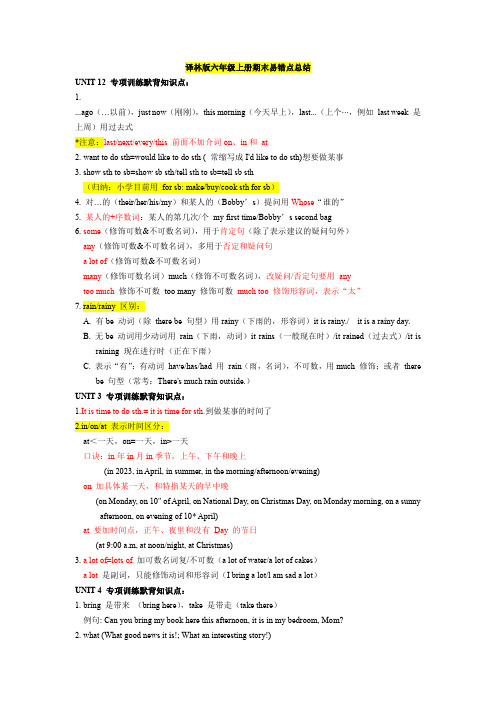
译林版六年级上册期末易错点总结UNIT 12 专项训练默背知识点:1....ago(…以前),just now(刚刚),this morning(今天早上),last...(上个⋯,例如last week 是上周)用过去式*注意:last/next/every/this 前面不加介词on、in和at2. want to do sth=would like to do sth ( 常缩写成I'd like to do sth)想要做某事3. show sth to sb=show sb sth/tell sth to sb=tell sb sth(归纳:小学目前用for sb: make/buy/cook sth for sb)4. 对…的(their/her/his/my)和某人的(Bobby’s)提问用Whose“谁的”5. 某人的+序数词:某人的第几次/个my first time/Bobby’s second bag6. some(修饰可数&不可数名词),用于肯定句(除了表示建议的疑问句外)any(修饰可数&不可数名词),多用于否定和疑问句a lot of(修饰可数&不可数名词)many(修饰可数名词)much(修饰不可数名词),改疑问/否定句要用anytoo much修饰不可数too many 修饰可数much too 修饰形容词,表示“太”7. rain/rainy 区别:A. 有be 动词(除there be 句型)用rainy(下雨的,形容词)it is rainy./ it is a rainy day.B. 无be 动词用少动词用rain(下雨,动词)it rains(一般现在时)/it rained(过去式)/it israining 现在进行时(正在下雨)C. 表示“有”:有动词have/has/had 用rain(雨,名词),不可数,用much 修饰;或者therebe 句型(常考:There's much rain outside.)UNIT 3 专项训练默背知识点:1.It is time to do sth.= it is time for sth.到做某事的时间了2.in/on/at 表示时间区分:at<一天,on=一天,in>一天口诀:in年in月in季节,上午、下午和晚上(in 2023, in April, in summer, in the morning/afternoon/evening)on 加具体某一天,和特指某天的早中晚(on Monday, on 10" of April, on National Day, on Christmas Day, on Monday morning, on a sunny afternoon, on evening of 10* April)at 要加时间点,正午、夜里和没有Day 的节日(at 9:00 a.m, at noon/night, at Christmas)3. a lot of=lots of加可数名词复/不可数(a lot of water/a lot of cakes)a lot 是副词,只能修饰动词和形容词(I bring a lot/l am sad a lot)UNIT 4 专项训练默背知识点:1. bring 是带来(bring here),take 是带走(take there)例句: Can you bring my book here this afternoon, it is in my bedroom, Mom?2. what (What good news it is!; What an interesting story!)3. with 就近原则:Look! Liu Tao(真正的主语)with his parents is picking apples on the farm.4. use sth to do sth, use的形容词useful 有用的,useless 无用的例句: We use new words to make a sentence to learn English.We use water to clean things every day.UNIT 56 专项训练默背知识点:1. 重点单词和词组:餐馆restaurant 扔垃圾litter走路回家walk home 把教室弄很脏make the classroom very dirty外出游玩go on an outing乘地铁上学take the metro to school例句: Billy slipped on the banana skin and fell.或者:Billy slips on the banana skin and falls.The meat/bread smells nice, I want to eat it.2. 不可数名词:smoke/air/energy,不可数名词做三单例:What makes the air dirty? Smoke(真正的主语)from cars and factories makes the air dirty.3. 常用加doing sth:like doing/Look! sb is doing...例: It's nine o'clock, the students are doing morning exercises.常用do sth: make sb do sth; let's=let us do sth; can/should/ must/please do sth常用加to do sth: what/how/why 等疑问词+to do sthUNIT 7 专项训练默背知识点:1. 用a还是用anan 字母题:口诀1.Mr Li has one fox. 李先生有一个狐狸。
译林版6A六年级英语易错题及答案
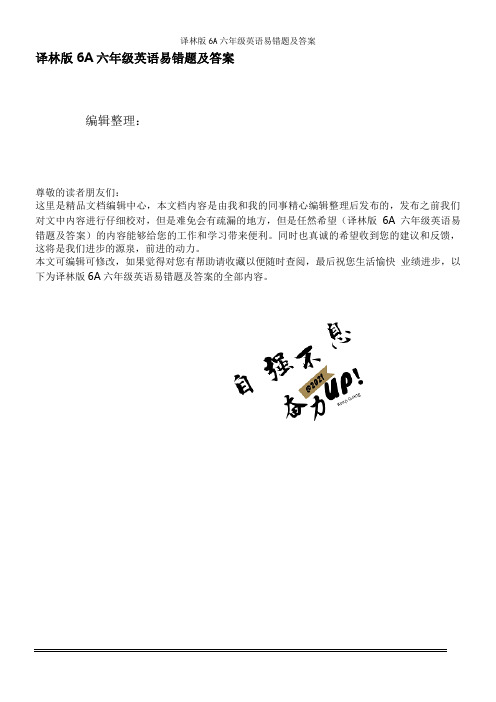
译林版6A六年级英语易错题及答案编辑整理:尊敬的读者朋友们:这里是精品文档编辑中心,本文档内容是由我和我的同事精心编辑整理后发布的,发布之前我们对文中内容进行仔细校对,但是难免会有疏漏的地方,但是任然希望(译林版6A六年级英语易错题及答案)的内容能够给您的工作和学习带来便利。
同时也真诚的希望收到您的建议和反馈,这将是我们进步的源泉,前进的动力。
本文可编辑可修改,如果觉得对您有帮助请收藏以便随时查阅,最后祝您生活愉快业绩进步,以下为译林版6A六年级英语易错题及答案的全部内容。
译林版6A六年级英语易错题姓名:____________________一、判断下列划线部分读音是否相同,相同的写“T”,不同的写“F".1。
( ) usually blue 2. () holiday Monday 3。
()think those4。
( ) father her 5. ( ) look good 6。
( ) June July7. ( ) birthday shirt 8。
( ) room food 9。
( )foolish food10. ( ) say ball 11。
() were where 12。
( ) mobile go13. ( ) played looked 14。
( ) thank those 15。
()pointed walked二、英汉互译.1。
whose football __________________ 2. spell the word _____________________3. 来自全世界____________________ 4。
fit well ______________________5。
start the story ____________________ 6。
骑自行车______________________7。
walk on the grass __________________ 8. public places ______________________9. wear paper T—shirt __________________ 10。
【译林版】六年级英语毕业考试期末复习小升初英语知识点大汇总附易错知识点总结
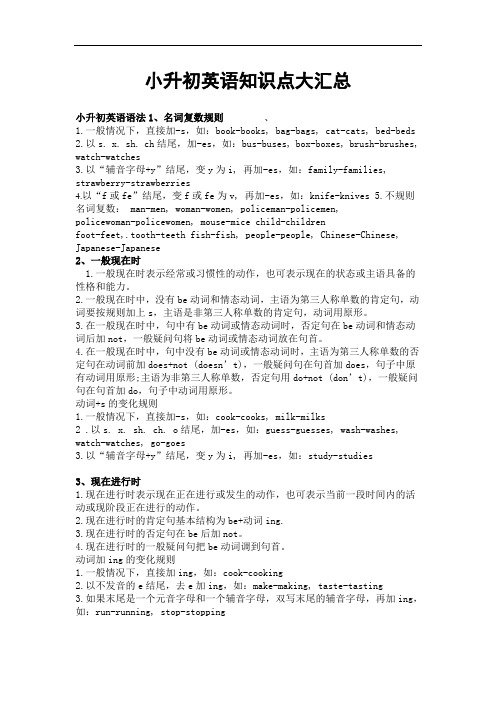
小升初英语知识点大汇总小升初英语语法1、名词复数规则、1.一般情况下,直接加-s,如:book-books, bag-bags, cat-cats, bed-beds2.以s. x. sh. ch结尾,加-es,如:bus-buses, box-boxes, brush-brushes, watch-watches3.以“辅音字母+y”结尾,变y为i, 再加-es,如:family-families, strawberry-strawberries4.以“f或fe”结尾,变f或fe为v, 再加-es,如:knife-knives5.不规则名词复数: man-men, woman-women, policeman-policemen,policewoman-policewomen, mouse-mice child-childrenfoot-feet,.tooth-teeth fish-fish, people-people, Chinese-Chinese, Japanese-Japanese2、一般现在时1.一般现在时表示经常或习惯性的动作,也可表示现在的状态或主语具备的性格和能力。
2.一般现在时中,没有be动词和情态动词,主语为第三人称单数的肯定句,动词要按规则加上s,主语是非第三人称单数的肯定句,动词用原形。
3.在一般现在时中,句中有be动词或情态动词时,否定句在be动词和情态动词后加not,一般疑问句将be动词或情态动词放在句首。
4.在一般现在时中,句中没有be动词或情态动词时,主语为第三人称单数的否定句在动词前加does+not (doesn’t),一般疑问句在句首加does,句子中原有动词用原形;主语为非第三人称单数,否定句用do+not (don’t),一般疑问句在句首加do,句子中动词用原形。
动词+s的变化规则1.一般情况下,直接加-s,如:cook-cooks, milk-milks2 .以s. x. sh. ch. o结尾,加-es,如:guess-guesses, wash-washes, watch-watches, go-goes3.以“辅音字母+y”结尾,变y为i, 再加-es,如:study-studies3、现在进行时1.现在进行时表示现在正在进行或发生的动作,也可表示当前一段时间内的活动或现阶段正在进行的动作。
精选译林版小学六年级英语毕业考试:小升初英语知识点大汇总
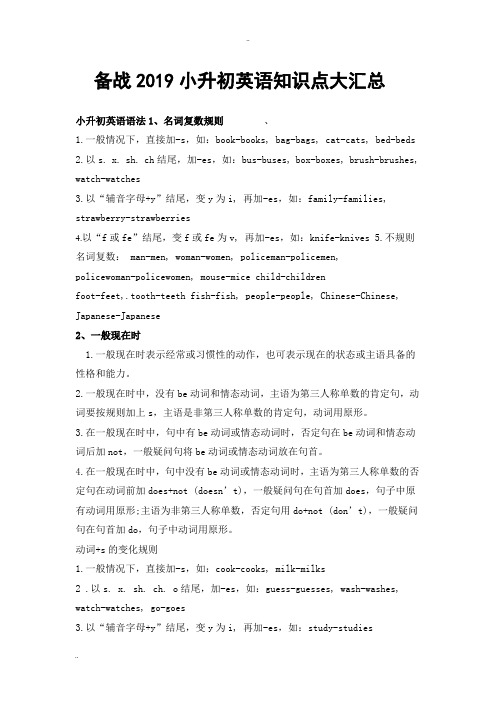
备战2019小升初英语知识点大汇总小升初英语语法1、名词复数规则、1.一般情况下,直接加-s,如:book-books, bag-bags, cat-cats, bed-beds2.以s. x. sh. ch结尾,加-es,如:bus-buses, box-boxes, brush-brushes, watch-watches3.以“辅音字母+y”结尾,变y为i, 再加-es,如:family-families, strawberry-strawberries4.以“f或fe”结尾,变f或fe为v, 再加-es,如:knife-knives5.不规则名词复数: man-men, woman-women, policeman-policemen,policewoman-policewomen, mouse-mice child-childrenfoot-feet,.tooth-teeth fish-fish, people-people, Chinese-Chinese, Japanese-Japanese2、一般现在时1.一般现在时表示经常或习惯性的动作,也可表示现在的状态或主语具备的性格和能力。
2.一般现在时中,没有be动词和情态动词,主语为第三人称单数的肯定句,动词要按规则加上s,主语是非第三人称单数的肯定句,动词用原形。
3.在一般现在时中,句中有be动词或情态动词时,否定句在be动词和情态动词后加not,一般疑问句将be动词或情态动词放在句首。
4.在一般现在时中,句中没有be动词或情态动词时,主语为第三人称单数的否定句在动词前加does+not (doesn’t),一般疑问句在句首加does,句子中原有动词用原形;主语为非第三人称单数,否定句用do+not (don’t),一般疑问句在句首加do,句子中动词用原形。
动词+s的变化规则1.一般情况下,直接加-s,如:cook-cooks, milk-milks2 .以s. x. sh. ch. o结尾,加-es,如:guess-guesses, wash-washes, watch-watches, go-goes3.以“辅音字母+y”结尾,变y为i, 再加-es,如:study-studies3、现在进行时1.现在进行时表示现在正在进行或发生的动作,也可表示当前一段时间内的活动或现阶段正在进行的动作。
新译林版英语六年级下册期末复习易错题和各单元重要句子

新译林版英语六年级下册期末复习易错题和各单元重要句子1.He often has dinner at home.2.Daniel and Tommy are in Class One.3.We do not watch TV on Monday.4.Nick does not go to the zoo on Sunday.5.Do they like the World Cup?6.What do they often do on Saturdays?7.Do your parents read newspapers every day?8.___.9.She and I take a walk ___.10.There is some water in the bottle.11.___ ___.12.They have the same hobby.13.___.14.You always do your homework well.15.I am ___ I'm staying in bed.16.___.17.Liu Tao does not like PE.18.The child often watches TV in the evening.What are you going to do next Monday。
I want to play basketball.What are you going to do next Monday。
I plan to play basketball.4.明天下午你打算去看电影吗?Are you going to watch a movie ___?Do you plan to watch a movie ___?5.他们将会在晚上九点到达。
They will arrive at nine o'clock in the evening.They are going to arrive at nine o'clock in the evening.6.我将在周末去购物。
译林版小学六年级英语毕业考试:小升初英语知识点大汇总

备战2019小升初英语知识点大汇总小升初英语语法1、名词复数规则、1.一般情况下,直接加-s,如:book-books, bag-bags, cat-cats, bed-beds2.以s. x. sh. ch结尾,加-es,如:bus-buses, box-boxes, brush-brushes, watch-watches3.以“辅音字母+y”结尾,变y为i, 再加-es,如:family-families, strawberry-strawberries4.以“f或fe”结尾,变f或fe为v, 再加-es,如:knife-knives5.不规则名词复数: man-men, woman-women, policeman-policemen,policewoman-policewomen, mouse-mice child-childrenfoot-feet,.tooth-teeth fish-fish, people-people, Chinese-Chinese, Japanese-Japanese2、一般现在时1.一般现在时表示经常或习惯性的动作,也可表示现在的状态或主语具备的性格和能力。
2.一般现在时中,没有be动词和情态动词,主语为第三人称单数的肯定句,动词要按规则加上s,主语是非第三人称单数的肯定句,动词用原形。
3.在一般现在时中,句中有be动词或情态动词时,否定句在be动词和情态动词后加not,一般疑问句将be动词或情态动词放在句首。
4.在一般现在时中,句中没有be动词或情态动词时,主语为第三人称单数的否定句在动词前加does+not (doesn’t),一般疑问句在句首加does,句子中原有动词用原形;主语为非第三人称单数,否定句用do+not (don’t),一般疑问句在句首加do,句子中动词用原形。
动词+s的变化规则1.一般情况下,直接加-s,如:cook-cooks, milk-milks2 .以s. x. sh. ch. o结尾,加-es,如:guess-guesses, wash-washes, watch-watches, go-goes3.以“辅音字母+y”结尾,变y为i, 再加-es,如:study-studies3、现在进行时1.现在进行时表示现在正在进行或发生的动作,也可表示当前一段时间内的活动或现阶段正在进行的动作。
译林版六年级上册期末英语 易错题(附解析)
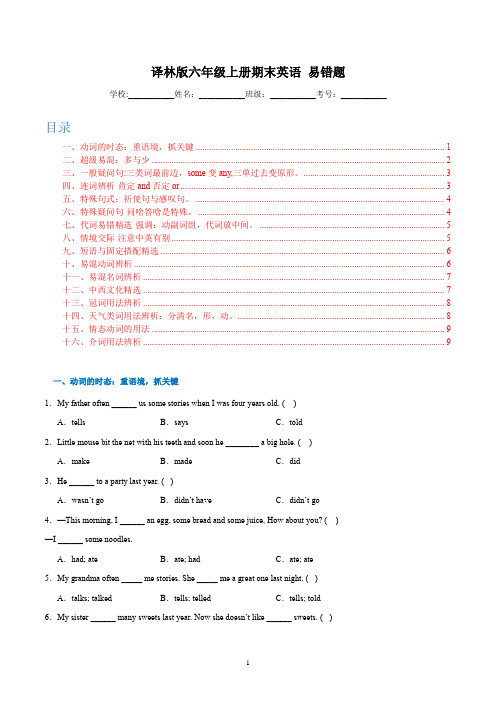
译林版六年级上册期末英语易错题学校:___________姓名:___________班级:___________考号:___________目录一、动词的时态:重语境,抓关键 (1)二、超级易混:多与少 (2)三、一般疑问句:三类词最前边,some变any,三单过去变原形。
(3)四、连词辨析-肯定and否定or (3)五、特殊句式:祈使句与感叹句。
(4)六、特殊疑问句-问啥答啥是特殊。
(4)七、代词易错精选-强调:动副词组,代词放中间。
(5)八、情境交际-注意中英有别 (5)九、短语与固定搭配精选 (6)十、易混动词辨析 (6)十一、易混名词辨析 (7)十二、中西文化精选 (7)十三、冠词用法辨析 (8)十四、天气类词用法辨析:分清名,形,动。
(8)十五、情态动词的用法 (9)十六、介词用法辨析 (9)一、动词的时态:重语境,抓关键1.My father often ______ us some stories when I was four years old. ()A.tells B.says C.told2.Little mouse bit the net with his teeth and soon he ________ a big hole. ()A.make B.made C.did3.He ______ to a party last year. ()A.wasn’t go B.didn’t have C.didn’t go4.—This morning, I ______ an egg, some bread and some juice, How about you? ()—I ______ some noodles.A.had; ate B.ate; had C.ate; ate5.My grandma often _____ me stories. She _____ me a great one last night. ()A.talks; talked B.tells; telled C.tells; told6.My sister ______ many sweets last year. Now she doesn’t like ______ sweets. ()A.eats; eating B.ate; eating C.ate; eats7.—____ did you ____ last week? ()—I visited my grandmother.A.Where; do B.Where; go C.What; do D.What; go 8.Mr. Smith _______ swimming every weekend. But he _______ do it last week. () A.goes; didn’t B.goes; doesn’t C.went; didn’t 9.—Does Mike often ________ kites at the weekend? ()—No, but he __________ kites with me last Saturday.A.fly; fly B.flew; flew C.fly; flew 10.Twenty years ago, my grandpa ______ news in the newspapers. ()A.reads B.read C.is reading11.I ate an apple ______. I am going to eat an orange ______. ()A.yesterday; tomorrow B.now; yesterday C.yesterday; now 12.My father ______ letters ______ his friends twenty years ago. ()A.wrote; for B.wrote; to C.writes; to 13.There ______ a football match tomorrow in the city. ()A.are going to be B.is going to have C.is going to be 14.—______ your parents ______ come to school for the Open Day? ()—Of course they will come.A.Are; going to B.Is; going to C.Is; going 15.Look at the black clouds in the sky. It ______ this afternoon. ()A.rains B.is going to rain C.rained D.rain 16.We ________ a picnic tomorrow. ()A.are having B.are going to have C.is going to have 17.I _______ a film next Sunday. ()A.watched B.am watching C.am going to watch 二、超级易混:多与少18.There are _______ plastic bags on the floor. Don’t use too _______ plastic. () A.many; many B.much; many C.many; much D.much; much19.It’s so hot outside, but there is _______ juice in the fridge. Let’s go shopping and buy some. () A.a little B.few C.a lot of D.little20.—So ______ dishes to wash, Mum. May I give you a hand? ()—Thank you, Lily! But, don’t use ______ water. We should save water.A.many; too many B.much; too much C.many; too much 21.We shouldn’t use _______ plastic bags. ()A.too many B.too much C.much too D.so much 22.Don’t use _____ plastic bags, Mum. ()A.to much B.too much C.too many23.The boy eats ________ meat every day, so he is fat. ()A.many B.much C.a few三、一般疑问句:三类词最前边,some变any,三单过去变原形。
(译林版)小学六年级英语毕业考试:小升初英语知识点大汇总-人教版
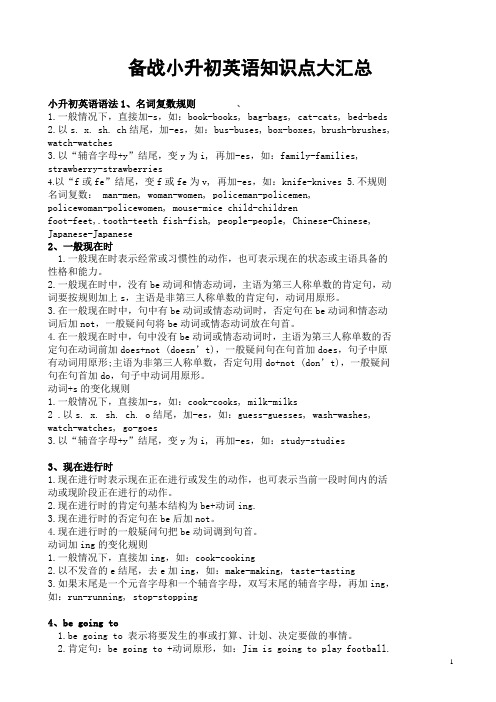
备战小升初英语知识点大汇总小升初英语语法1、名词复数规则、1.一般情况下,直接加-s,如:book-books, bag-bags, cat-cats, bed-beds2.以s. x. sh. ch结尾,加-es,如:bus-buses, box-boxes, brush-brushes, watch-watches3.以“辅音字母+y”结尾,变y为i, 再加-es,如:family-families, strawberry-strawberries4.以“f或fe”结尾,变f或fe为v, 再加-es,如:knife-knives5.不规则名词复数: man-men, woman-women, policeman-policemen,policewoman-policewomen, mouse-mice child-childrenfoot-feet,.tooth-teeth fish-fish, people-people, Chinese-Chinese, Japanese-Japanese2、一般现在时1.一般现在时表示经常或习惯性的动作,也可表示现在的状态或主语具备的性格和能力。
2.一般现在时中,没有be动词和情态动词,主语为第三人称单数的肯定句,动词要按规则加上s,主语是非第三人称单数的肯定句,动词用原形。
3.在一般现在时中,句中有be动词或情态动词时,否定句在be动词和情态动词后加not,一般疑问句将be动词或情态动词放在句首。
4.在一般现在时中,句中没有be动词或情态动词时,主语为第三人称单数的否定句在动词前加does+not (doesn’t),一般疑问句在句首加does,句子中原有动词用原形;主语为非第三人称单数,否定句用do+not (don’t),一般疑问句在句首加do,句子中动词用原形。
动词+s的变化规则1.一般情况下,直接加-s,如:cook-cooks, milk-milks2 .以s. x. sh. ch. o结尾,加-es,如:guess-guesses, wash-washes, watch-watches, go-goes3.以“辅音字母+y”结尾,变y为i, 再加-es,如:study-studies3、现在进行时1.现在进行时表示现在正在进行或发生的动作,也可表示当前一段时间内的活动或现阶段正在进行的动作。
译林英语六年级上册期末复习易错题整理

译林英语六年级上册期末复习易错题整理一、辨音( )1.A. dear B. where C. there D. pear( )2.A. palace B. national C. ant D. another二、单选1.He ________ at school yesterday morning. Do you know where he went?A.isn’tB. wasn’tC. doesn’tD. didn’t2.I don’t like ________ days.A. rainingB. rainyC. rainD. rains3.The little girl didn’t know the answer. She ________ to think hard.A. haveB. hasC. havingD. had4.—Why ________ they so hungry? --Because they ________ have dinner.A. do; didn’tB. were; don’tC. are; didn’tD. did; didn’t5. ________ great fun!A. HowB. What aC. ItD. What6.There are a lot of people ________ the street.A. inB. atC. withD. on7.My father likes ________ with his friends at the weekends.A. going to fishB. go fishingC. going fishD. going fishing8.Don’t ________ anywhere. We should keep the classroom clean.A. letterB. lessonC. litterD. little9.Mike often walks ________ after school.A. homeB. parkC. the parkD. to home10.Your father is sleeping. You ______ shout.A. canB. shouldC. shouldn’tD. no11.The ________ on the wall mean “Wet floor”.A. signB. signsC. thingD. things三、词汇运用1.I’d like ________ (拜访) Aunt Alice.2.Sam is ________ (仍然) looking out of the window.3.Don’t be afraid to l________ your face. Please speak English loudly.4.You should h________ onto the chair. The bus is going fast.5.He is our father’s father. We are his g________.6.The little girl runs t________ the forest quickly.7.Did you visit Tian’anmen ________ (广场) last winter?8.Helen likes animal ________ (表演) very much.9.--What happened to Mike? --He s________ on the ice and hurt his leg.10.Look at the sign. It means “D________”. Please stay away from the house.11.As a student, I can do something ________(使) our school clean.四、适当形式填空1.It was ________ (rain) on Monday.2.What about ________ (play) basketball tomorrow?3.The king wanted ________ (make) new clothes.4.There ________ (be) any apples on the table now, but there ________ some yesterday.5.—Who’s ________ (穿) red today? --Su Yang and Nancy.6.It often ________ (rain) in spring. = It is often ________ (rain) in spring.7.There ________ (be) lots of ________ (rain) last week.8. ________ (play) ball games can make us strong.9. ________ (eat) too ________ (much) ________ (sweet) ________ (be) bad for us.10.My mother ________ to music five years ago. But now she ________ to music every evening. (listen)11.It often ________ in spring. It ________ heavily last night. It was ________ this morning. Listen! It ________. (rain)12.It’s time ________ lunch. Look! They ________ lunch. (have)五、句型转换1.Nancy picked some apples and went fishing. (改为一般现在时)Nancy ________ some apples and ________ fishing.2.My holiday was great fun. (改为一般疑问句)________ ________ ________ great fun?(划线部分提问) ________ ________ ________ holiday?3.Bobby comes home late. (改为否定句) Bobby ________ ________ home late.4.The boy did well yesterday. (改为否定句)The boy ________ ________ well yesterday.5.We can walk to school to keep the city clean. (对划线部分提问)________ can you ________ to keep the city clean?6.We go to the park by bike. (改为同义句)We ________ ________ to the park.六、翻译句子1.昨天公园里有一场有趣的表演,我们看到了许多鹦鹉。
【译林版】小学六年级英语毕业考试:易错知识点总结(Word版,6页)
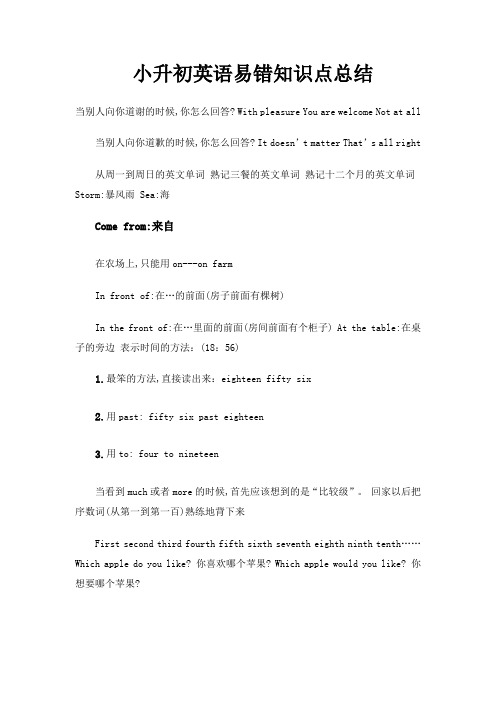
小升初英语易错知识点总结当别人向你道谢的时候,你怎么回答? With pleasure You are welcome Not at all当别人向你道歉的时候,你怎么回答? It doesn’t matter That’s all right从周一到周日的英文单词熟记三餐的英文单词熟记十二个月的英文单词Storm:暴风雨 Sea:海Come from:来自在农场上,只能用on---on farmIn front of:在…的前面(房子前面有棵树)In the front of:在…里面的前面(房间前面有个柜子) At the table:在桌子的旁边表示时间的方法:(18:56)1.最笨的方法,直接读出来:eighteen fifty six2.用past: fifty six past eighteen3.用to: four to nineteen当看到much或者more的时候,首先应该想到的是“比较级”。
回家以后把序数词(从第一到第一百)熟练地背下来First second third fourth fifth sixth seventh eighth ninth tenth……Which apple do you like? 你喜欢哪个苹果? Which apple would you like? 你想要哪个苹果?介词后面动词必须加ing。
(以小升初考试难度为限) 喜欢做某事的句型: Like doing; like to do; Enjoy doing; feel like doing; be interested in doing;在用play的时候,如果后面是“运动项目”的话,就直接用play跟运功项目就可以; 但如果是“乐器”的话,就得在乐器前面加“the”;如: Play basketball; play football; Play the piano; play the drum;写作文时,一定要注意时态的问题,尤其是在日记中,通常都用过去时。
译林版苏教英语六年级上学期期末错题归纳与专题练习
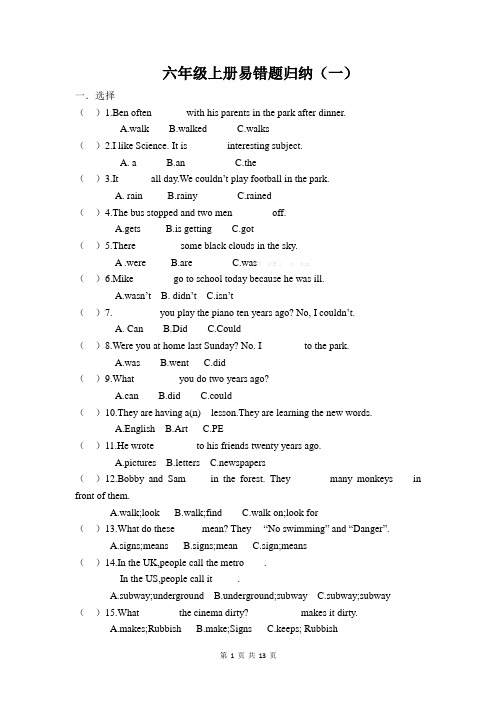
六年级上册易错题归纳(一)一.选择()1.Ben often ______ with his parents in the park after dinner.A.walkB.walkedC.walks()2.I like Science. It is________interesting subject.A. aB.anC.the()3.It______ all day.We couldn’t play football in the park.A. rainB.rainyC.rained()4.The bus stopped and two men _______ off.A.getsB.is gettingC.got()5.There ________ some black clouds in the sky.A .were B.are C.was X kB 1 . c o m()6.Mike _______ go to school today because he was ill.A.wasn’tB. didn’tC.isn’t()7._________ you play the piano ten years ago? No, I couldn’t.A. CanB.DidC.Could()8.Were you at home last Sunday? No. I________ to the park.A.wasB.wentC.did()9.What ________ you do two years ago?A.canB.didC.could()10.They are having a(n)__lesson.They are learning the new words.A.EnglishB.ArtC.PE()11.He wrote________ to his friends twenty years ago.A.picturesB.lettersC.newspapers()12.Bobby and Sam_____in the forest. They _______many monkeys in front of them.A.walk;lookB.walk;findC.walk on;look for()13.What do these _____mean? They __“No swimming” and “Danger”.A.signs;meansB.signs;meanC.sign;means()14.In the UK,people call the metro____.In the US,people call it_____.A.subway;undergroundB.underground;subwayC.subway;subway()15.What _______ the cinema dirty? __________makes it dirty.A.makes;RubbishB.make;SignsC.keeps; Rubbish()16.________ the river dirty? Yes. The fish _______ dead.A.is;areB.Is;areC. Is;is()17.We should not cut down too many trees. It’s bad______the Earth.A.ofB.toC.for()18.Helen _______us _______her hobbies.A.tells;toB.tells;aboutC.talks;to二.首字母填空1.Why are the children l______? Because the story is fun.2.Who’s w_______yellow today?3.We can call people anywhere with a m________ p_______.三.根据中文翻译句子1.莉莉的姑妈经常穿着一件蓝色的毛衣和黑色的长裤。
译林六年级英语知识点
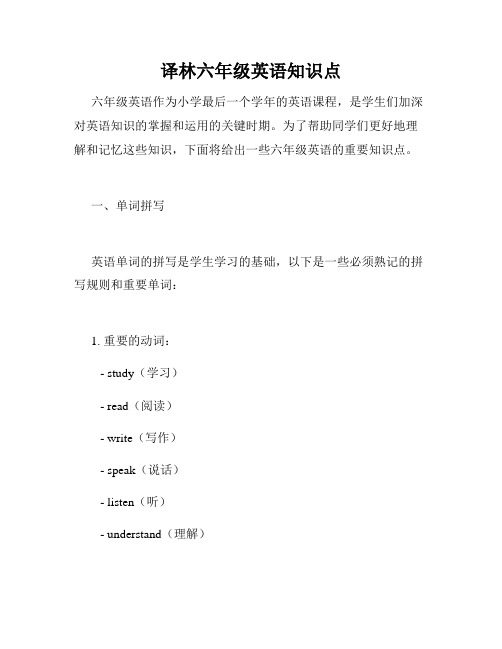
译林六年级英语知识点六年级英语作为小学最后一个学年的英语课程,是学生们加深对英语知识的掌握和运用的关键时期。
为了帮助同学们更好地理解和记忆这些知识,下面将给出一些六年级英语的重要知识点。
一、单词拼写英语单词的拼写是学生学习的基础,以下是一些必须熟记的拼写规则和重要单词:1. 重要的动词:- study(学习)- read(阅读)- write(写作)- speak(说话)- listen(听)- understand(理解)2. 表示人物的名词:- teacher(老师)- student(学生)- parent(家长)- friend(朋友)- classmate(同学)3. 表示时间的名词:- Monday(星期一)- Tuesday(星期二)- Wednesday(星期三) - Thursday(星期四) - Friday(星期五)- Saturday(星期六) - Sunday(星期日)4. 表示学科的名词:- Chinese(语文)- English(英语)- Math(数学)- Science(科学)- History(历史)二、语法知识六年级英语语法知识的灵活运用是整个英语学习过程中的关键。
下面是一些重要的语法知识点:1. 现在进行时(Present Continuous):- 结构:主语 + am/is/are + 动词-ing- 用法:表示现在正在进行的动作- 例句:I am reading a book.(我正在看书。
)2. 一般过去时(Simple Past):- 结构:主语 + 动词过去式- 用法:表示过去已经发生的动作- 例句:He watched a movie yesterday.(他昨天看了一部电影。
)3. 一般将来时(Simple Future):- 结构:主语 + will + 动词原形- 用法:表示将来要发生的动作- 例句:We will go to the zoo tomorrow.(我们明天要去动物园。
译林版小学六年级英语毕业考试:小升初英语知识点大汇总(已审阅)

备战2019小升初英语知识点大汇总小升初英语语法1、名词复数规则、1.一般情况下,直接加-s,如:book-books, bag-bags, cat-cats, bed-beds2.以s. x. sh. ch结尾,加-es,如:bus-buses, box-boxes, brush-brushes, watch-watches3.以“辅音字母+y”结尾,变y为i, 再加-es,如:family-families, strawberry-strawberries4.以“f或fe”结尾,变f或fe为v, 再加-es,如:knife-knives5.不规则名词复数: man-men, woman-women, policeman-policemen,policewoman-policewomen, mouse-mice child-childrenfoot-feet,.tooth-teeth fish-fish, people-people, Chinese-Chinese, Japanese-Japanese2、一般现在时1.一般现在时表示经常或习惯性的动作,也可表示现在的状态或主语具备的性格和能力。
2.一般现在时中,没有be动词和情态动词,主语为第三人称单数的肯定句,动词要按规则加上s,主语是非第三人称单数的肯定句,动词用原形。
3.在一般现在时中,句中有be动词或情态动词时,否定句在be动词和情态动词后加not,一般疑问句将be动词或情态动词放在句首。
4.在一般现在时中,句中没有be动词或情态动词时,主语为第三人称单数的否定句在动词前加does+not (doesn’t),一般疑问句在句首加does,句子中原有动词用原形;主语为非第三人称单数,否定句用do+not (don’t),一般疑问句在句首加do,句子中动词用原形。
动词+s的变化规则1.一般情况下,直接加-s,如:cook-cooks, milk-milks2 .以s. x. sh. ch. o结尾,加-es,如:guess-guesses, wash-washes, watch-watches, go-goes3.以“辅音字母+y”结尾,变y为i, 再加-es,如:study-studies3、现在进行时1.现在进行时表示现在正在进行或发生的动作,也可表示当前一段时间内的活动或现阶段正在进行的动作。
(译林版)小学六年级英语毕业考试:小升初英语知识点大汇总-人教版
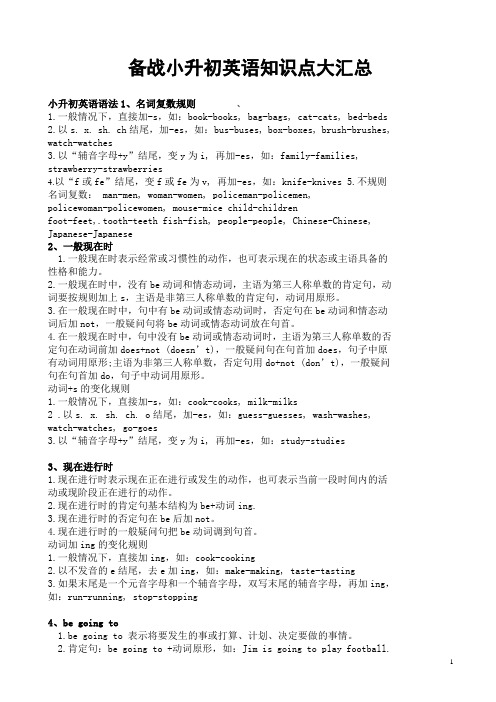
备战小升初英语知识点大汇总小升初英语语法1、名词复数规则、1.一般情况下,直接加-s,如:book-books, bag-bags, cat-cats, bed-beds2.以s. x. sh. ch结尾,加-es,如:bus-buses, box-boxes, brush-brushes, watch-watches3.以“辅音字母+y”结尾,变y为i, 再加-es,如:family-families, strawberry-strawberries4.以“f或fe”结尾,变f或fe为v, 再加-es,如:knife-knives5.不规则名词复数: man-men, woman-women, policeman-policemen,policewoman-policewomen, mouse-mice child-childrenfoot-feet,.tooth-teeth fish-fish, people-people, Chinese-Chinese, Japanese-Japanese2、一般现在时1.一般现在时表示经常或习惯性的动作,也可表示现在的状态或主语具备的性格和能力。
2.一般现在时中,没有be动词和情态动词,主语为第三人称单数的肯定句,动词要按规则加上s,主语是非第三人称单数的肯定句,动词用原形。
3.在一般现在时中,句中有be动词或情态动词时,否定句在be动词和情态动词后加not,一般疑问句将be动词或情态动词放在句首。
4.在一般现在时中,句中没有be动词或情态动词时,主语为第三人称单数的否定句在动词前加does+not (doesn’t),一般疑问句在句首加does,句子中原有动词用原形;主语为非第三人称单数,否定句用do+not (don’t),一般疑问句在句首加do,句子中动词用原形。
动词+s的变化规则1.一般情况下,直接加-s,如:cook-cooks, milk-milks2 .以s. x. sh. ch. o结尾,加-es,如:guess-guesses, wash-washes, watch-watches, go-goes3.以“辅音字母+y”结尾,变y为i, 再加-es,如:study-studies3、现在进行时1.现在进行时表示现在正在进行或发生的动作,也可表示当前一段时间内的活动或现阶段正在进行的动作。
(译林版)小学六年级英语毕业考试:小升初英语知识点大汇总-人教版
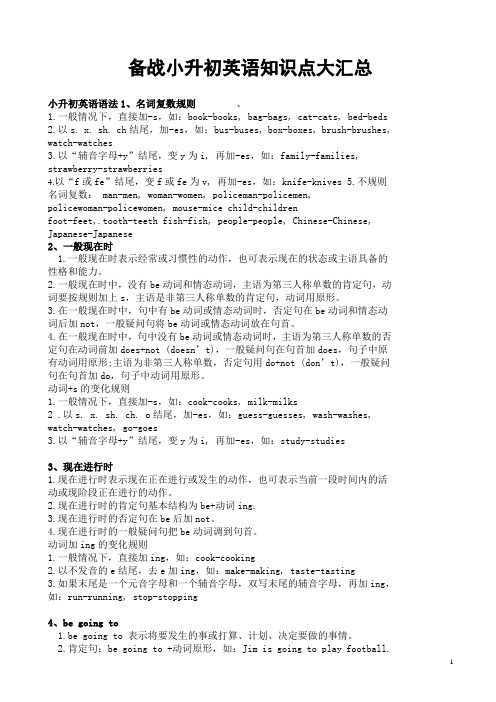
备战小升初英语知识点大汇总小升初英语语法1、名词复数规则、1.一般情况下,直接加-s,如:book-books, bag-bags, cat-cats, bed-beds2.以s. x. sh. ch结尾,加-es,如:bus-buses, box-boxes, brush-brushes, watch-watches3.以“辅音字母+y”结尾,变y为i, 再加-es,如:family-families, strawberry-strawberries4.以“f或fe”结尾,变f或fe为v, 再加-es,如:knife-knives5.不规则名词复数: man-men, woman-women, policeman-policemen,policewoman-policewomen, mouse-mice child-childrenfoot-feet,.tooth-teeth fish-fish, people-people, Chinese-Chinese, Japanese-Japanese2、一般现在时1.一般现在时表示经常或习惯性的动作,也可表示现在的状态或主语具备的性格和能力。
2.一般现在时中,没有be动词和情态动词,主语为第三人称单数的肯定句,动词要按规则加上s,主语是非第三人称单数的肯定句,动词用原形。
3.在一般现在时中,句中有be动词或情态动词时,否定句在be动词和情态动词后加not,一般疑问句将be动词或情态动词放在句首。
4.在一般现在时中,句中没有be动词或情态动词时,主语为第三人称单数的否定句在动词前加does+not (doesn’t),一般疑问句在句首加does,句子中原有动词用原形;主语为非第三人称单数,否定句用do+not (don’t),一般疑问句在句首加do,句子中动词用原形。
动词+s的变化规则1.一般情况下,直接加-s,如:cook-cooks, milk-milks2 .以s. x. sh. ch. o结尾,加-es,如:guess-guesses, wash-washes, watch-watches, go-goes3.以“辅音字母+y”结尾,变y为i, 再加-es,如:study-studies3、现在进行时1.现在进行时表示现在正在进行或发生的动作,也可表示当前一段时间内的活动或现阶段正在进行的动作。
(译林版)小学六年级英语毕业考试:小升初英语知识点大汇总-人教版

备战小升初英语知识点大汇总小升初英语语法1、名词复数规则、1.一般情况下,直接加-s,如:book-books, bag-bags, cat-cats, bed-beds2.以s. x. sh. ch结尾,加-es,如:bus-buses, box-boxes, brush-brushes, watch-watches3.以“辅音字母+y”结尾,变y为i, 再加-es,如:family-families, strawberry-strawberries4.以“f或fe”结尾,变f或fe为v, 再加-es,如:knife-knives5.不规则名词复数: man-men, woman-women, policeman-policemen,policewoman-policewomen, mouse-mice child-childrenfoot-feet,.tooth-teeth fish-fish, people-people, Chinese-Chinese, Japanese-Japanese2、一般现在时1.一般现在时表示经常或习惯性的动作,也可表示现在的状态或主语具备的性格和能力。
2.一般现在时中,没有be动词和情态动词,主语为第三人称单数的肯定句,动词要按规则加上s,主语是非第三人称单数的肯定句,动词用原形。
3.在一般现在时中,句中有be动词或情态动词时,否定句在be动词和情态动词后加not,一般疑问句将be动词或情态动词放在句首。
4.在一般现在时中,句中没有be动词或情态动词时,主语为第三人称单数的否定句在动词前加does+not (doesn’t),一般疑问句在句首加does,句子中原有动词用原形;主语为非第三人称单数,否定句用do+not (don’t),一般疑问句在句首加do,句子中动词用原形。
动词+s的变化规则1.一般情况下,直接加-s,如:cook-cooks, milk-milks2 .以s. x. sh. ch. o结尾,加-es,如:guess-guesses, wash-washes, watch-watches, go-goes3.以“辅音字母+y”结尾,变y为i, 再加-es,如:study-studies3、现在进行时1.现在进行时表示现在正在进行或发生的动作,也可表示当前一段时间内的活动或现阶段正在进行的动作。
(译林版)小学六年级英语毕业考试:小升初英语知识点大汇总-人教版

备战小升初英语知识点大汇总小升初英语语法1、名词复数规则、1.一般情况下,直接加-s,如:book-books, bag-bags, cat-cats, bed-beds2.以s. x. sh. ch结尾,加-es,如:bus-buses, box-boxes, brush-brushes, watch-watches3.以“辅音字母+y”结尾,变y为i, 再加-es,如:family-families, strawberry-strawberries4.以“f或fe”结尾,变f或fe为v, 再加-es,如:knife-knives5.不规则名词复数: man-men, woman-women, policeman-policemen,policewoman-policewomen, mouse-mice child-childrenfoot-feet,.tooth-teeth fish-fish, people-people, Chinese-Chinese, Japanese-Japanese2、一般现在时1.一般现在时表示经常或习惯性的动作,也可表示现在的状态或主语具备的性格和能力。
2.一般现在时中,没有be动词和情态动词,主语为第三人称单数的肯定句,动词要按规则加上s,主语是非第三人称单数的肯定句,动词用原形。
3.在一般现在时中,句中有be动词或情态动词时,否定句在be动词和情态动词后加not,一般疑问句将be动词或情态动词放在句首。
4.在一般现在时中,句中没有be动词或情态动词时,主语为第三人称单数的否定句在动词前加does+not (doesn’t),一般疑问句在句首加does,句子中原有动词用原形;主语为非第三人称单数,否定句用do+not (don’t),一般疑问句在句首加do,句子中动词用原形。
动词+s的变化规则1.一般情况下,直接加-s,如:cook-cooks, milk-milks2 .以s. x. sh. ch. o结尾,加-es,如:guess-guesses, wash-washes, watch-watches, go-goes3.以“辅音字母+y”结尾,变y为i, 再加-es,如:study-studies3、现在进行时1.现在进行时表示现在正在进行或发生的动作,也可表示当前一段时间内的活动或现阶段正在进行的动作。
- 1、下载文档前请自行甄别文档内容的完整性,平台不提供额外的编辑、内容补充、找答案等附加服务。
- 2、"仅部分预览"的文档,不可在线预览部分如存在完整性等问题,可反馈申请退款(可完整预览的文档不适用该条件!)。
- 3、如文档侵犯您的权益,请联系客服反馈,我们会尽快为您处理(人工客服工作时间:9:00-18:30)。
小升初英语易错知识点总结
当别人向你道谢的时候,你怎么回答? With pleasure You are welcome Not at all 当别人向你道歉的时候,你怎么回答? It doesn’t matter That’s all right
从周一到周日的英文单词熟记三餐的英文单词熟记十二个月的英文单词 Storm:暴风雨Sea:海
Come from:来自
在农场上,只能用on---on farm
In front of:在…的前面(房子前面有棵树)
In the front of:在…里面的前面(房间前面有个柜子) At the table:在桌子的旁边表示时间的方法:(18:56)
1.最笨的方法,直接读出来:eighteen fifty six
2.用past: fifty six past eighteen
3.用to: four to nineteen
当看到much或者more的时候,首先应该想到的是“比较级”。
回家以后把序数词(从第一到第一百)熟练地背下来
First second third fourth fifth sixth seventh eighth ninth tenth…… Which apple do you like? 你喜欢哪个苹果? Which apple would you like? 你想要哪个苹果?
介词后面动词必须加ing。
(以小升初考试难度为限) 喜欢做某事的句型: Like doing; like to do; Enjoy doing; feel like doing;
be interested in doing;
在用play的时候,如果后面是“运动项目”的话,就直接用play跟运功项目就可以; 但如果是“乐器”的话,就得在乐器前面加“the”;如: Play basketball; play football; Play the piano; play the drum;
写作文时,一定要注意时态的问题,尤其是在日记中,通常都用过去时。
On and on: 连续不断。
Exchange:交换
Each other: 相互之间
情态动词后面 + 动词原型
包括:must, may, can, will, shall;
Might, could, would, should.
在一般将来时中,如出现:when, if, as soon as等表示条件的词时,作为条件的从句就必须用一般现在时代替将来时,以“如果明天下雨我就不去公园了”这句话为例,句子中包含两部分,一句是:明天下雨;另一句是:我不去公园。
按理来说两个都时将来时因为他们都没有发生,可是如果写在一个句子里面的话,就必须写成: If it rains tomorrow, I will not go to the park. Teach的过去式是:taught
一般现在时的句式:主语 + 动词 + 时间关键点。
(遵循三单原则) 进行时的句式:主语 + be + doing + 时间关键点。
完成时的句式:
主语 + have或has + 动词过去分词。
Won’t = will not
Not…until…:直到…才
第三人称单数后加es的情况:动词是以sh, ch, o, s, 辅音字母加y结尾的。
Arrive:到达
Hear sb doing: 听见某人正在做某事。
See sb doing:
看见某人正在做某事
让某人做某事的句型(祈使句): Ask sb to do; Tell sb to do; Get sb to do; Have sb do; Make sb do; Let sb do.
一定要区分清楚,前面三个是要加to的,后面三个不用。
帮助某人做某事: Help sb to do; Help sb do; Help sb with sth.
Eg: He often helps me with my English. Enough: 足够的。
用法分两种:①ebough + 名词②形容词 + enough
I will be back.我还会回来的(终结者台词)。
Stop doing: 停下手头所有的事。
Stop to do: 停下手头的一件事去做另外一件事。
Eg: he stopped playing football. 他停下踢足球。
He stopped to play football. 他停下手头的事去踢足球。
Do you mind my opening the window? 你介意我把窗户打开吗? Do you mind my smoking here? 你介意我在这抽烟吗?
Do you mind my troubling you now? 你介意我麻烦一下你吗?
Miss: 错过;思念。
The boy sitting there is my brother,坐在那的那个男孩是我弟弟。
这句话中,sitting虽然在屁股后面加了1个ing,但并不是代表进行时的概念,而是用1个ing表示那个男孩正处在“sitting”这个状态中,但可以把这句话理解为“那个正坐在那的男孩是我弟弟”,这样的话会更易于理解。
Have a rest: 休息一会儿问职业怎么问? What is your father?
What does your father do? What is your father’s job? Decide to do sth: 决定做某事 Save money: 攒钱、节约钱 Save time: 节省时间 On the internet: 在网上
Surf on the Internet,在网上冲浪
Any 用于疑问或否定句,但有些情况下,当你向别人求助的时候,以问句的形式发出,为了表示委婉语气,就必须用some来代替any.比如: May I ask you some questions?
记住,此句中的may千万不可用can代替,may的概念是“可以,允许”,而can的概念指的是“能够,能力”;
比如,“我会游泳”,用的是“I can swim.”,表示的是你有游泳这种能力; This room is twice as big as that one. 这个房间是那个房间的两倍大。
Match: 比赛
Used to do: 过去经常做某事
I used to play football after class when I was young. Size: 尺寸
Hear from: 收到某人来信 Receive: 收到
It is right that to help mother do housework.= to help mother do housework is right. One of the longest walls in the world: 世界上最长的墙之一。
One of the biggest cities in the world: 世界上最大的城市之一。
Turn on: 打开 Turn off:关上Turn down: 把声音关小
Bring: 带来Take: 带走
Fetch: 去拿了又回来Leave: 离开(left, left)
名次性物主代词:mine, his, hers, theirs, ours, yours. (就是相当于名词)
形容词性物主代词:my, his, her, their, our, your.(后面必须加某样动词,而不能单独存在)
A few: 一些,一点(加可数名词) A little: 一些,一点(加不可数名词) 形容雨很大时,用:heavy.
In order to: 为了…
I take notes in order to study well. 我做笔记,为了学地更好。
Set up: 建立,设立Take down: 拿下来 ill: 生病了
“明天有一个会议”的表达方法: There is a meeting tomorrow.
There is going to be a meeting tomorrow. We have a meeting tomorrow. A meeting will be given tomorrow. Village: 乡村 Together: 一起 Come ture: 实现
Dress in = wear: 穿着、打扮 For: 表对象;时间段的持续。
Is that real: 那是真的吗? Film = Movie 电影 Neither…nor…既不。
也不 Either…or…:或者。
或者 None: 没有一个(三者以上)
Spend…in doing…花费(时间)做某事 Happen: 发生 Get marry: 结婚
A piece of paper: 一张纸 Cough: 咳嗽
I have no choice but…: 我别无选择。
I am afraid that : 我恐怕。
I don’t like anything = I like nothing.
She seems to be worried now = it seems that she is worried now. Do well in = be good at: 擅长做某事。
